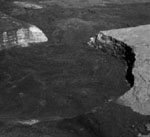|
Mike Carr
–
geologist
|

|
"
It is easy to be intimidated by fields outside ones own specialty and use only the techniques of ones own field.
" |
 |
| |
|
|
|
| |
How were you motivated to choose your particular field? |
| |
My original motivation to become a geologist sprang from two sources; a thorough grounding in science acquired in high school and an interest in the outdoors that arose through being heavily involved in the Boy Scouts. I grew up in Leeds, a large industrial city in northern England, and was fortunate to go to an excellent high school. At that time England had a two-tier educational system in which the top ten percent of any age group was placed in faster moving, more demanding schools. My high school Physics, Chemistry and Biology teachers were especially stimulating. But so were my classmates, and several went on to get Ph.D.s in various sciences.
In my teens I became very active in scouting. During almost every vacation and many weekends we went camping, hiking and caving in the Pennines , the Lake District and elsewhere in northern England. As a consequence I developed an interest in geology, botany and other natural sciences, and those interests remain to this day.
In England, at that time, you had to choose your major before you went to college. Geology just seemed a natural choice. I applied to various universities and was accepted at the University of London. Whilst at the University of London, interest in geology was re-enforced by fieldwork in Dorset, South Wales, North Wales, Scotland, and arctic Norway. I worked in some of the most spectacular countryside in the British Isles.
So that is how I became a geologist. (I subsequently went on to get a Ph.D. at Yale)
|
|

|
| |
|
|
|
| |
What can you share about your creative process? |
| |

|
|
I wish I knew what the creative process is. I go through extended periods when I feel I am drifting aimlessly, not sure what to do next. Then I will get an idea or take on a task, and become obsessed with it. I will think about it while driving, while eating, while in bed at night. I will go into the office at all hours, and never get tired. I will feel marvelously alive. Then the project will be completed and I will go back to the same dull, meandering state I was in before the obsession. Clearly the aimless drifting is part of the creative process, but I don't know what is going on. In the obsessive state I do not want contact with the outside world. Any activity not feeding the obsession is viewed as an annoyance. But in the drifting state I need to talk to and listen to others at workshops, science meetings and so forth. Science can be a very lonely pastime, and for me it is very important to get external stimulation during those periods when the internal drive seems to be lacking.
Gaining a working knowledge of subjects outside one's own specialty is very important. So often breakthroughs occur because of insights gained through applications to one field of knowledge or techniques from another field. It is easy to be intimidated by fields outside ones own specialty and use only the techniques of ones own field. It is just people like oneself, who are working in other fields, and one should not be intimidated.
|
|
| |
|
|
|
| |
What ideas do you have for a future human community on Mars?
|
| |
I have always found the rationale for establishing permanent colonies on Mars somewhat elusive. I can see the rationale for science expeditions to learn more about how and why the planet has evolved so differently from the Earth. But I have trouble rationalizing colonization of Mars as an end in itself or as a first step in extending human presence beyond the Earth. The Earth is such a lush, luxuriant, and comfortable place. Why would one emigrate to a place so hostile as Mars? However, the question posed was if one was to set up a village on Mars (perhaps as a base camp for scientific exploration) then what should that village be like.
I imagine that one could build a reasonably tolerable community with 100 people. I have experienced isolation for a field season, during which communication was effectively restricted to four people. One yearned for other contacts (and other food). One hundred is large enough that relationships need not become stale, and minor idiosyncrasies would not become major irritations. As to what the mix should be, I have no strong opinions other than the need for diversity. It would be very desirable to have men, women and children in proportions similar to on Earth, and perhaps with age spreads similar to on Earth. I would not like to be in a community in which the adults are all in their twenties and thirties (perhaps because I am in my sixties). Similarly diversity in background and talents would be needed.
Obviously one would need people with talents necessary for survival (engineers, medical personnel, construction workers, farmers, and so forth.), but there would also be a need for people with talents that extend beyond those needed for mere survival, people with musical, artistic and communication talents. I really don't think that one needs ultra-sophisticated artists such as concert pianists but rather folk artists that can entertain informally and encourage participation. Their artistic activities would be secondary to their primary survival roles, just as in villages in medieval Europe or in colonial America. Until modern times, most European communities of 100 or so people lived almost in isolation normally being only occasionally visited by itinerant peddlers or friars. Most people spent their whole life without ever going more than 20 miles from their village, yet I am sure that most people led reasonably satisfying lives. A village on Mars might be somewhat similar, and given time one could imagine indigenous folk art and music developing.
One major difference between a village on Mars and one on Earth would the natural surroundings. I find it hard to believe that one could live a fulfilled and adjusted life while being separated from the natural living world that surrounds us on Earth. - the fields, the forests, the birds, the animals. Surely this is just as important for a bearable life as the community of people. Imagine living for years on an aircraft carrier. Even though there might be 1000 to 2000 people with different talents, life would be pretty unsatisfying. So I would think that one would want to re-create some quasi-natural environment a lá Kew Gardens on Mars where one might try and maintain some sort of connection with nature as we know it on Earth.
|
|

|
|




